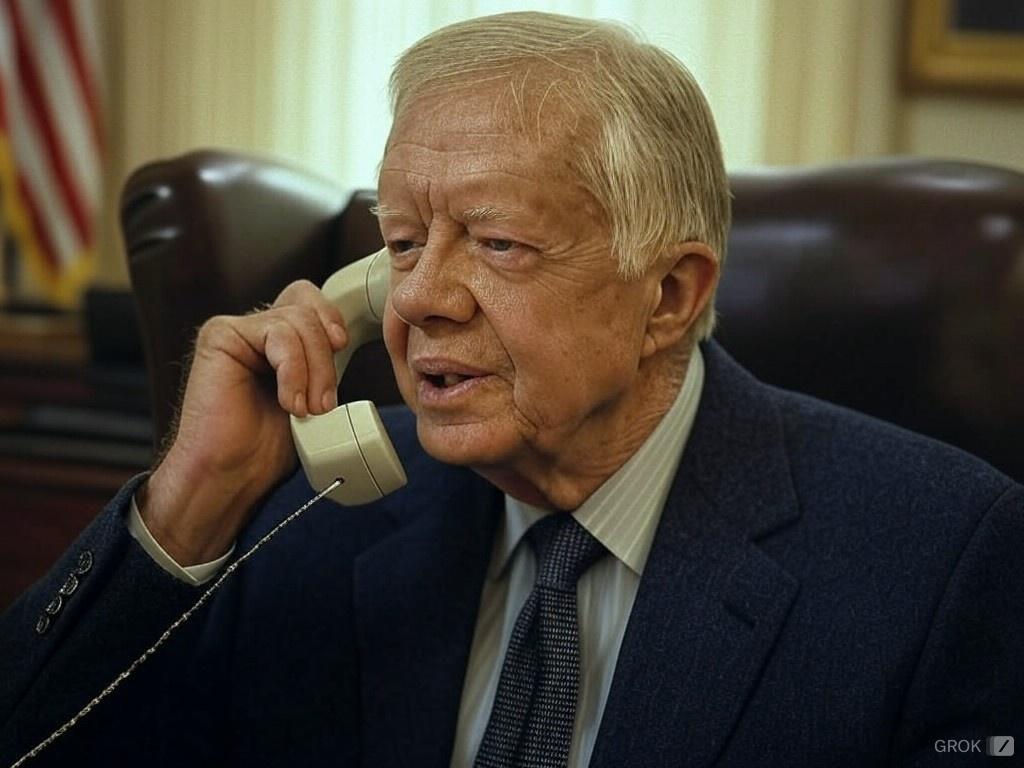Carter's Iranian Legacy Still Lingers

30 December 2024
The death of President Jimmy Carter at 100, a man lionized for his post-presidential philanthropy but often chastised for his naïveté in office, reopens a chapter of history that many would prefer to forget. Among Carter’s myriad challenges—raging inflation, energy crises, and Soviet adventurism—it was the Iran Hostage Crisis that branded his presidency with an enduring legacy of impotence.
One cannot discuss Iran’s foreign policy today without revisiting the spectacle of American diplomats paraded as trophies of humiliation. The question now is not whether Carter’s legacy endures in Tehran’s imagination but whether the West’s indulgence of Iranian aggression has proven Carteresque in its timidity.
Consider this: nearly half a century later, Iran’s leaders continue to thumb their noses at international norms with the swagger of a regime that learned all the wrong lessons from 1979. The Islamic Republic’s foreign policy is an unrepentant cocktail of ideological fervor and cynical opportunism. The chants of “Death to America” that echoed through Tehran’s streets in the Carter years remain a soundtrack to the regime’s defiance. And why wouldn’t they? Iran has reaped the rewards of holding firm, whether through geopolitical extortion or the exploitation of Western reluctance to draw hard lines.
The roots of this posturing are neither obscure nor accidental. The Islamic Republic’s foundational narrative—a rebellion against the Shah’s perceived Western puppetry—demands a permanent adversary to sustain its legitimacy. Khomeini’s doctrine was not merely anti-Shah; it was militantly anti-Western, an ideology enshrined in the hostage crisis. This moment was not just an act of defiance but a template for future confrontations. Iran’s persistent interference in regional conflicts and sponsorship of proxy militias are extensions of this inaugural declaration of hostility.
Yet, Iran’s ability to play the victim of “Western imperialism” while acting as a regional predator speaks to the failure of its adversaries to confront it decisively. The 2015 Joint Comprehensive Plan of Action (JCPOA) was celebrated by many as a triumph of diplomacy. In reality, it was a Band-Aid on a gangrenous wound. By granting Iran economic relief without addressing its ballistic missile program or regional adventurism, the deal emboldened the regime. When the Trump administration withdrew, Tehran’s response was predictable: ramp up enrichment, saber-rattle, and wait for the world to blink.
To suggest, as some do, that Iran’s belligerence is solely a response to Western provocation is to ignore the agency of a regime that thrives on confrontation. Tehran’s provocations—from the tanker hijackings in the Gulf to its proxy war in Yemen—are not reactive but strategic. They are calculated moves in a game where the West’s self-imposed rules do not apply. Carter’s cautious, almost plaintive approach to Tehran during the hostage crisis has been replicated in diluted form by successive administrations, each hoping that the regime might evolve into something resembling a rational actor. Hope, as history has shown, is not a strategy.
The stakes of this dynamic are neither theoretical nor distant. Iran’s pursuit of nuclear weapons capability—veiled in the language of peaceful energy development—is a clear and present danger. Its continued enrichment of uranium, far beyond the limits of the JCPOA, is not merely a breach of trust but a brazen challenge to the international community. Its entrenchment in Syria, Iraq, and Lebanon suggests an empire-building ambition that defies containment. The regime’s actions are not relics of the Carter era but evidence that Tehran sees itself as locked in an eternal struggle where conciliation is weakness.
As the world looks ahead, the question is whether Iran’s adversaries will finally break free of the Carter doctrine of soft diplomacy. The Biden administration’s tentative overtures toward reviving the JCPOA, coupled with Europe’s habitual handwringing, risk perpetuating the cycle of appeasement. A harder policy—one that combines economic strangulation with credible military deterrence—may be the only language Tehran understands. This is not a call for reckless aggression but a recognition that failure to confront Iran decisively now may lead to a far costlier confrontation later.
Jimmy Carter, for all his virtues, epitomized a style of leadership ill-suited to the brutal calculus of Middle Eastern geopolitics. The Islamic Republic of Iran is not a misunderstood partner waiting for an olive branch; it is a theocratic autocracy whose survival depends on perpetuating conflict. To break the cycle of hostility, the West must dispense with the illusions of Carter’s era and face Iran with clarity and resolve. The stakes demand nothing less.
